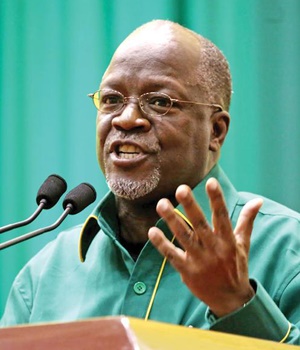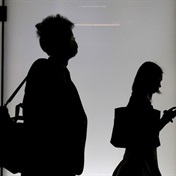
New east African president has cut back on state spending and is smashing corruption, writes Liezel de Lange
A new broom, or rather bulldozer, has taken charge in Tanzania. Within three months, he has taken major steps against corruption. The question is whether President John Magufuli can keep it up.
When Tinga Tinga (The Bulldozer) took over as Tanzania’s fifth president, he did not let the grass grow under his anti-corruption feet. On his first day in office in November, he made a surprise visit to the finance ministry and told off the officials who weren’t at their desks.
Shortly after, he cancelled the exorbitant independence celebrations. “It’s a disgrace that we should be spending money on celebrations while our people are dying from cholera,” Magufuli told German news agency DPA.
The festival budget of $1.9 million (R30 million at the current exchange rate) was reallocated to a clean-up campaign, for which he put on gloves himself and picked up litter in Dar es Salaam’s streets.
Money for the commemoration of World Aids Day was reallocated to buy antiretroviral drugs for HIV-positive Tanzanians. The budget for the lavish state banquet after the opening of Parliament was cut and the money used for beds for the public hospital in Dar es Salaam. This after Magufuli paid a surprise visit to the hospital and found patients on the ground. He sacked the head of the hospital.
Magufuli reduced Tanzania’s Cabinet from 55 to 34 (ministers and deputies) and placed severe restrictions on foreign visits, CNN reported. He himself travels only by car.
Officials in the Tanzanian revenue office were suspended and corrupt managers at the ports authority were dismissed.
One of his newest decrees is that there will be nothing except nuts, fruit, water and juice at meetings that last less than two hours.
These are just some of the steps Magufuli took within three months in a country rejected by international donors in 2014 because of corruption and misappropriation.
Dr Mzukisi Qobo of the Pan-African Institute at the University of Johannesburg said: “He has moved very fast after becoming president and this has struck a chord with the popular view in Tanzania and the rest of the continent.”
On Twitter, the hashtag #WhatWouldMagufuliDo appears regularly, with Tanzanians posting funny pictures (and sometimes serious ideas) on how cash can be saved.
Magufuli won with a strong anti-corruption message in Tanzania’s most competitive election since independence in 1961. He was the candidate of the ruling Chama Cha Mapinduzi (CCM) party and collected 58% of the votes.
Magufuli, a devout Roman Catholic and father of five, used to be a chemistry and mathematics teacher, obtaining a doctorate in chemistry from the University of Dar es Salaam in 2009. He was an MP for a long time and served as the minister of public works. In this portfolio, he was nicknamed The Bulldozer, thanks to the multibillion-dollar road-building projects he successfully managed.
Joseph Warioba, a former prime minister, told BBC Africa: “For many years, he was the minister of public works, where he managed megaprojects, but he was never involved in a corruption scandal. Magufuli is not new to the Tanzanian government. He has observed the challenges and what corruption has done to the country.
“His heart is in the right place, but it is too soon to judge if he will be consistent in his leadership against corruption.
“He is doing all the right things for now, but we’ll see if it continues.”
Qobo noted that Magufuli would not be able to conduct surprise visits all over the show and solve all the problems himself. He needed the right people to help with that. For comparison, Qobo pointed to the optimism that had also prevailed when Mwai Kibaki took over in Kenya in 2002.
Rolf Paasch of the Friedrich Ebert Foundation in Dar es Salaam added to that: “A year later, all that had crumbled – corruption was just too deeply rooted in [Kenya’s] state institutions. There are many people in the bureaucracy and [Magufuli’s] party who will quietly try to resist and sabotage the attempted changes. They will be waiting for him to fail.
“The question is whether he can muster a critical mass of supporters who will support the implementation of the declared reforms against a well-rehearsed resistance.”
Qobo said Magufuli had the backing of his party and the CCM secretary-general, but he pointed out that the reform of state institutions was a long and complicated process.
“What we sometimes forget is that the biggest test for a functioning democracy is not the individual, but the functioning of the independent institutions of the state.”
Among the most important legacies Magufuli can leave for his country is a well-reasoned and progressive Constitution, says Qobo. The process of changing the Tanzanian Constitution was launched before the election, but was not completed and a referendum must still be held.
Damas Lucas, a Tanzanian journalist, told The Guardian that the extensive powers the current Tanzanian Constitution gives the president are enough to make even the most honest leader succumb to temptation. Currently, he is above the law; no president can (even in retirement) be prosecuted for something he or she did during his or her term. Nor is the Auditor-General allowed to review the presidency’s spending.
Magufuli may be above self-enrichment, but a better-drafted Constitution will keep his successors in check.
Lucas was also concerned about the times Magufuli apparently ignored the law when he was a minister because he wanted to complete projects.
“Examples are people who won court cases against him because their houses were demolished illegally to make way for new roads,” said Lucas.
Melanie Meirotti of the Electoral Institute for Sustainable Democracy in Africa, who attended the Tanzanian elections as an observer for the African Union, said the Constitution should be clearer about the Tanzanian electoral commission’s powers and duties.
Meirotti said in a report for the SA Institute of International Affairs that although the election was largely declared free and fair, the opposition had been concerned about guidelines in the event of something going wrong.
Another sticky point for Magufuli is the political crisis in neighbouring island Zanzibar, where the opposition says they were tricked out of an election victory. Zanzibar’s residents will go to the polls again in March, but Magufuli is yet to say anything about this.
Paasch said: “The million-dollar question is whether President Magufuli will be able to support his courageous, popular and populist actions by implementing the necessary regulatory changes – from practical organisational changes all the way up to revisiting the aborted constitutional reforms.
“Constitutional reform would be the final precondition for making democratic reforms – and making his anti-corruption campaign sustainable.”




 Publications
Publications
 Partners
Partners








